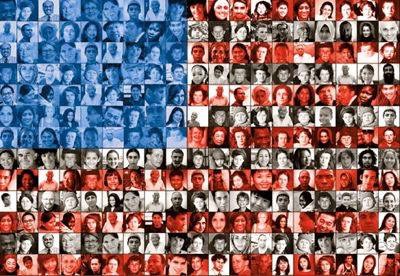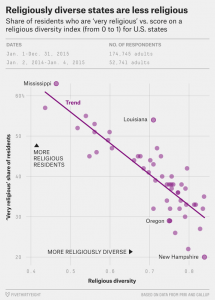In the United States, our diversity is seen as a source of national pride and a worthy ambition, but new evidence suggests that religious pluralism could undermine the vitality of America’s religious communities.
Fivethirty-eight.com reports:
The American religious landscape is transforming rapidly. At one time, religious diversity meant: Baptist, Methodist and Episcopalian. Today, it encompasses a multiplicity of religious traditions such as Sikhism, Buddhism, Islam and Hinduism, as well as an increasing variety of noninstitutional belief systems such as humanism, skepticism, atheism and subjective spirituality. Racial and ethnic shifts have also changed the face of Christianity. The U.S. was once a predominantly white Christian country, but fewer than half of Americans (45 percent) identify as white Christian today.
We don’t know for sure that America’s religious pluralism is causing a drop in religious vitality — there are reasons to think the two might simply be related — but there are a number of different ways diversity might erode commitment. The practical effect of rising religious diversity is to expose Americans to ideas and views that could challenge their religious beliefs. Arecent survey found that 77 percent of Americans are acquainted with someone who is nonreligious, 61 percent know someone who is Jewish and 38 percent know someone who is Muslim. The widening array of religious beliefs and identities also challenges long-held understandings of America’s Christian heritage and religious character that can reinforce a commitment to religion. This weakening of America’s religious consensus means there is far less social pressure to conform to religious norms. For young people coming of age today, America’s Christian heritage is no longer a given, and being Christian is not viewed as a critical component of national identity.1
Geographically, states with greater religious variety tend to exhibit lower levels of overall religiosity.2 No state is more religiously uniform than Mississippi. It is a place where, as my colleague and native Mississippian Robert Jones once said: “It’s hard to swing a dead cat without hitting a Baptist.” And this is not far from the truth. Half of the state’s populationidentifies as Baptist and 54 percent are evangelical Protestant. No other state is so singularly dominated by a single faith tradition. It’s probably no coincidence that Mississippi is also one of the few states with constitutions that prohibit atheists from serving in elected office. According to Gallup’s 2016 rankings of the most and least religious states, Mississippi has the honor of being the most religious state in the country.3 In contrast, Oregon ranks high in terms of religious diversity — no one religious tradition makes up more than 20 percent of the state’s population — and falls near the bottom in Gallup’s ranking. Only four states are less religious.


